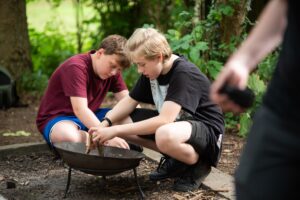Laura Howard is a Psychologist and Mindfulness Teacher and one of the many experts who we collaborated with to create resources for our Little Troopers Secondary School Resource Hub. In this guest blog, Laura tells us why mindfulness can help military children acknowledge and manage their feelings about deployment, separation and change and how teachers can use the Little Troopers mindfulness resources in the classroom.
I am lucky enough to be the mother of three gorgeous children living in the beautiful South West of England. However, family life has not always been so idyllic. My husband was a Royal Marine for 14 years and undertook many overseas tours. I drew a lot of strength from other military families but it is fair to say that at times I (and the children) really struggled. As a psychologist, I was used to telling other people how to manage their stress and anxiety levels but hadn’t really invested much time and energy in my own mental well-being, until this point. After the birth of our second child a friend introduced me to Mindfulness through a Mindfulness-based Stress Reduction course. It was life changing.
What is mindfulness?
Mindfulness is about training the muscle of attention so that your mind (attention) is where you would like it to be, preferably in the here and now. Our minds have a habit of moving about, for example outside the window (daydreaming), into the future (worrying), into the past (regretting/ruminating) and many other places. When we can learn to spot the places our mind visits most often, we can then recognise when it is a helpful or an unhelpful place for our mind to be. The next step then involves bringing the mind back to the present moment. Mindfulness is also about cultivating attitudes of patience, kindness and non-judgment, towards ourselves and others.
What surprised me the most when I started practicing mindfulness was the impact it had on my children indirectly. It was like ‘being present’ was all that they needed from me in order to be able to cope with the challenges of being a military family. I began to make more time and space in our lives instead of filling our days with ‘let’s keep busy’ type activities. This in turn allowed room for feelings and emotions to surface and rather than pushing them away or avoiding them we learnt to feel what was already here. Mindfulness didn’t take away all the unpleasant thoughts and emotions wrapped up in having a spouse at war, but it helped me to accept things as they were and to pay attention to all the amazing life events that were unfolding right in front of me.
I then began to introduce mindful activities to my children and I was pleased to see that they gained a lot from learning how to be still and how to use their senses to connect with the present moment. Of course, they missed their dad but they began to notice more and more of the small things in their day that made them smile or that gave them a warm feeling in their tummy rather than always feeling like there was a dark cloud hanging over their heads.
Mindfulness and military children
By teaching children, and in particular military children, the skill of being mindful we are equipping them with a lifelong skill for well-being. Military children often feel a sense of little or no control over their lives. Mindfulness gives military children a set of skills that allows them to acknowledge their feelings whilst not letting the feelings consume them or send them off on a chain of reactions impacting both their physical and mental health. The world is full of negative news and images from home and abroad and this can be even more distressing for a young person who has a parent deployed. Mindfulness can help a young person to recognise all the good and pleasant events that are constantly taking place around them even in the midst of the difficult.
I was extremely proud to be asked to provide some content for the Little Troopers Secondary School Resource Hub. There are a number of mindfulness-based activities in the hub that can help teachers support the young people from military families in their school. These activities work best if you are able to engage in them with the young people and to then have a conversation about your shared experiences of ‘paying attention in the present moment’.
Mindfulness works best when it is embedded within the culture of a school, where teachers and staff also have an understanding of and have experienced mindfulness training. The systemic cultivation of key attitudes: acceptance, non-judgment, kindness and patience can make a vast difference for military children and their families when staring at a new school. It needn’t stop at the school gates either, many schools have embraced mindfulness to such an extent that they offer training for parents and local members of the community.






